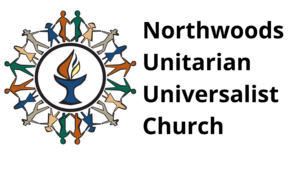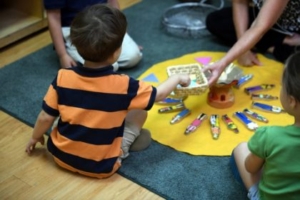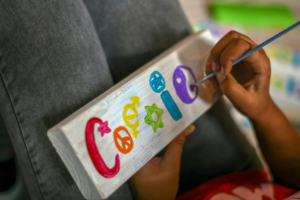Welcome families!
Join us for School of Magic and Mystery
Wands Up! Join Our Magical Summer Adventure Church Camp!
July 14 – 18 2025
About Our Classes:
Our Religious Education classes and meetings teach our Unitarian Universalist principles and values, and promote understanding of world religions.
Children and Youth will begin each Sunday in the sanctuary then leave after the Time For All Ages. They will proceed to Room 10 for Children’s Chapel, Choir Practice, Pageant Practice, Social Justice Work, or Community Building with the Coordinator of Religious Education or Lead Volunteer Helper while the teachers are able to remain in the worship service until 11:15 (approximately the end of the sermon).
Classes are held from 11:15-12:00 in classrooms. Parents are welcome to visit with the adults after service until classes have ended.
Chalice Children
(2-3 yrs of age)
Our youngest class uses “Celebrating Me and My World” as their curriculum guide. Opportunities are given to listen to simple stories, participate in age-appropriate activities, and to “play church.” Themes include Special Me, My World, and Other People. Play is the primary focus since this is how young children learn.
Spirit Play
(PK-1st grade)
Children explore our Unitarian Universalist values and principles through Montessori-based storytelling and opportunities for extension activities. Stories are shared using manipulatives which are then kept on the shelf for exploration. These stories are from many different faith traditions as well as our Unitarian Universalist traditions and are followed by questions allowing children to wonder.
Explorers
(2nd-4th grade)
This class will be using a combination of curriculums to provide diversity in the learning styles and content that children of this age crave.
- “LEGO® ValUUes” will focus on introducing the Article II values of pluralism, interdependence, generosity, equity, justice, transformation, and love through storybooks, discussion, and play activities.
- “World Blessings” introduces students to our world’s diverse countries, religions, and cultures through cooking. Books are used to ground the day’s lesson. In addition, blessings are shared that would be authentically used from the culture in which the recipe originates as an aid to learning.
Middle School
(5th-7th grade)
Our Middlers will be involved in Crossing Paths this year. In keeping with all of our Unitarian Universalist values, especially the free and responsible search for truth and meaning, this program actively engages youth in exploring the religious traditions in their community. This exploration leads to an increased understanding and appreciation of other faith traditions as they relate and connect to our faith.
Options for families with younger children.
Wee Worship
We have a “Wee Worship” area with books, puzzles, and toys for our youngest congregants in the Sanctuary.
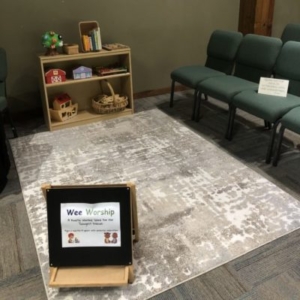
Childcare
Childcare is available for children 2-3 years of age. The nursery is staffed by childcare workers every Sunday from 10:00 a.m. to 12:30 p.m.
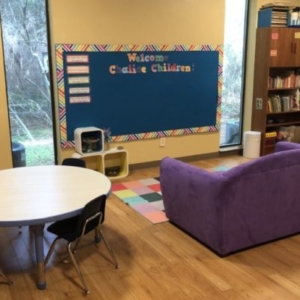
Family Room
Across the hall from the kitchen is the Family Room. Parents who wish to take their infants or young children out of the service for any reason may go into the family room to continue to see and hear the service while tending to their child’s needs.
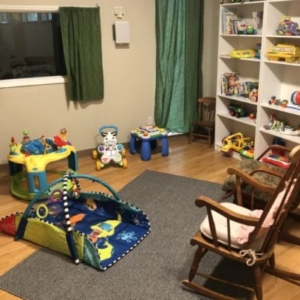
Activity Folders
Should your family choose to keep children in the sanctuary during the service, activity folders are provided for children (or adults, for that matter!) who need something to do with their hands during the service. Please help your child put the materials back into the folder and return the folder at the end of service.
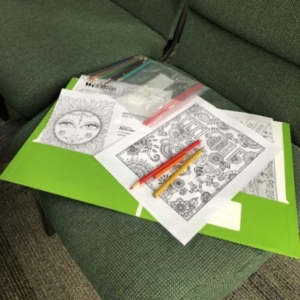
8 Principles of Unitarian Universalism
The foundation of our religious education programming.
1st Principle: We believe that each and every person is important.
2nd Principle: We believe that all people should be treated fairly and kindly.
3rd Principle: We believe that we should accept one another and keep on learning together.
4th Principle: We believe that each person must be free to search for what is true and right in life.
5th Principle: We believe that all persons should have a vote about the things that concern them.
6th Principle: We believe in working for a peaceful, fair, and free world.
7th Principle: We believe in caring for our planet Earth, the home we share with all living things.
8th Principle: Journeying toward spiritual wholeness by working to build a diverse multicultural Beloved Community by our actions that accountably dismantle racism and other oppressions in ourselves and our institutions.
